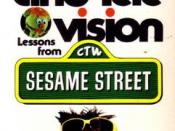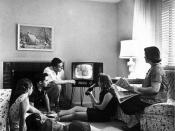This paper outlines three positive aspects of watching the television as well as a refuting paragraph saying why the television may not be all that well on one's mind. This is written in a persuasive style, thus there is an intro with underlined thesis, three supporting paragraphs, a refuting paragraph, and a conclusion restating the thesis.
The television has received either acceptance or rejection from everyone. Some view it as something that rots brains through pointless programs, but is this entirely true? Granted, some television programs serve no value whatsoever, nonetheless, that doesn't mean they're all trivial. If asked how people, as children, learned colors and numbers, or who taught how to share with others, most would think back to the popular children's shows of the time. In general, the television can teach factual information, life skills, and it can even promote early talking for infants. So, are all shows meaningless forms of entertainment or does the television have favorable effects on children? Although there are shows that have no advantage in watching, the television, if monitored by an adult, can have positive, beneficial effects on children.
One benefit of television on younger children is that it teaches them life skills. Shows like Sesame Street, Winnie the Pooh, and Mr. Rodgers demonstrate much needed skills for later in life. These shows, as well as many others, display life skills such as how to deal with problems, how to tell the truth, and proper behavior like sharing and being polite. In addition to this, there are many shows that help with even simpler things like shapes, colors, and numbers. All of these concepts are, at some point in time, hard for each person. That's precisely the reason that the television has propitious shows like these that come up with creative...


